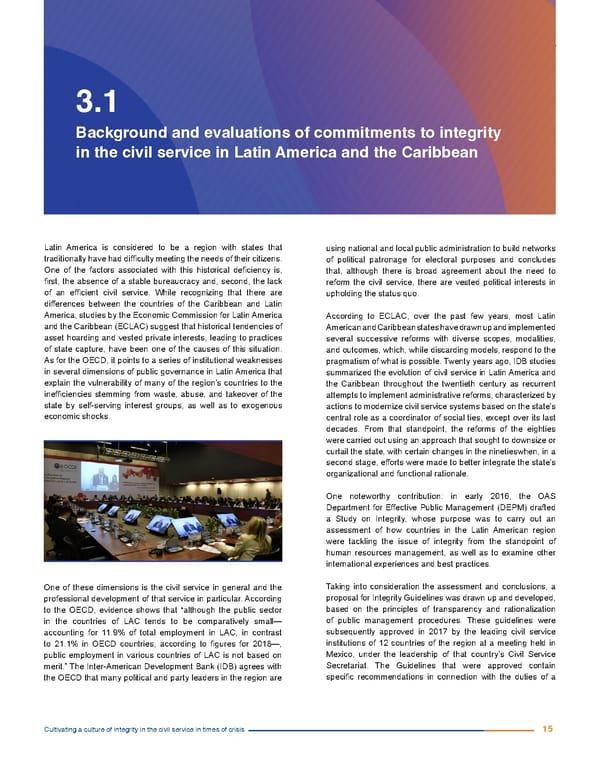3.1 Background and evaluations of commitments to integrity in the civil service in Latin America and the Caribbean Latin America is considered to be a region with states that using national and local public administration to build networks traditionally have had difficulty meeting the needs of their citizens. of political patronage for electoral purposes and concludes One of the factors associated with this historical deficiency is, that, although there is broad agreement about the need to first, the absence of a stable bureaucracy and, second, the lack reform the civil service, there are vested political interests in of an efficient civil service. While recognizing that there are upholding the status quo. differences between the countries of the Caribbean and Latin America, studies by the Economic Commission for Latin America According to ECLAC, over the past few years, most Latin and the Caribbean (ECLAC) suggest that historical tendencies of American and Caribbean states have drawn up and implemented asset hoarding and vested private interests, leading to practices several successive reforms with diverse scopes, modalities, of state capture, have been one of the causes of this situation. and outcomes, which, while discarding models, respond to the As for the OECD, it points to a series of institutional weaknesses pragmatism of what is possible. Twenty years ago, IDB studies in several dimensions of public governance in Latin America that summarized the evolution of civil service in Latin America and explain the vulnerability of many of the region’s countries to the the Caribbean throughout the twentieth century as recurrent inefficiencies stemming from waste, abuse, and takeover of the attempts to implement administrative reforms, characterized by state by self-serving interest groups, as well as to exogenous actions to modernize civil service systems based on the state’s economic shocks. central role as a coordinator of social ties, except over its last decades. From that standpoint, the reforms of the eighties were carried out using an approach that sought to downsize or curtail the state, with certain changes in the ninetieswhen, in a second stage, efforts were made to better integrate the state’s organizational and functional rationale. One noteworthy contribution: in early 2016, the OAS Department for Effective Public Management (DEPM) drafted a Study on Integrity, whose purpose was to carry out an assessment of how countries in the Latin American region were tackling the issue of integrity from the standpoint of human resources management, as well as to examine other international experiences and best practices. One of these dimensions is the civil service in general and the Taking into consideration the assessment and conclusions, a professional development of that service in particular. According proposal for Integrity Guidelines was drawn up and developed, to the OECD, evidence shows that “although the public sector based on the principles of transparency and rationalization in the countries of LAC tends to be comparatively small— of public management procedures. These guidelines were accounting for 11.9% of total employment in LAC, in contrast subsequently approved in 2017 by the leading civil service to 21.1% in OECD countries, according to figures for 2018—, institutions of 12 countries of the region at a meeting held in public employment in various countries of LAC is not based on Mexico, under the leadership of that country’s Civil Service merit.” The Inter-American Development Bank (IDB) agrees with Secretariat. The Guidelines that were approved contain the OECD that many political and party leaders in the region are specific recommendations in connection with the duties of a Cultivating a culture of integrity in the civil service in times of crisis 15
 Cultivating a culture of integrity in the civil service in times of crisis. Page 22 Page 24
Cultivating a culture of integrity in the civil service in times of crisis. Page 22 Page 24